#vorontsov palace
Explore tagged Tumblr posts
Text
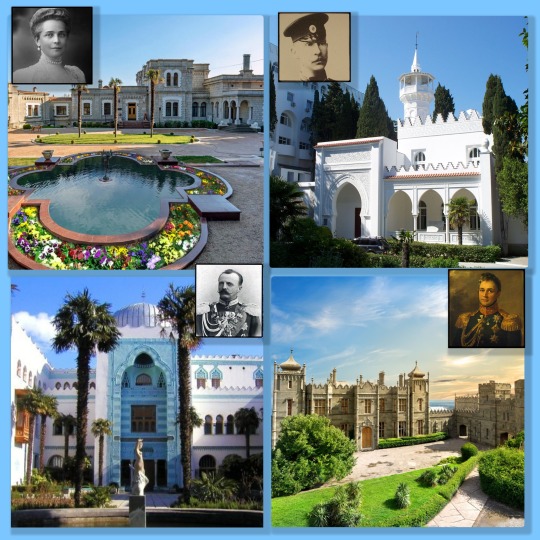
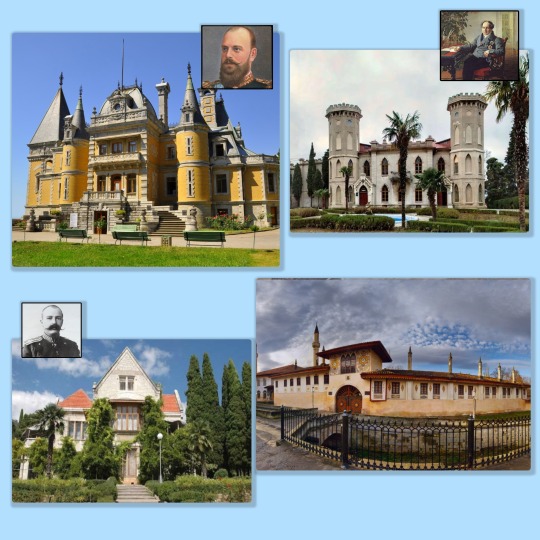
The other palaces in the Crimea
The Palace of Koreiz was owned by the Yousupov Family, and the inside photos show an exquisite place. It is worth taking the time to check them out.
The Palace of Kichkine was built by Grand Duke Dmitry Konstantinovich as a place he could enjoy with his nephews.
Dulber means "beautiful" or "heart stealing" in Tartar. This palace was built by Grand Duke Pyotr Nikolaievich. Design and construction were based on his sketches. The Grand Duke had great knowledge of Middle Eastern Architecture and history. The palace has more than 100 rooms.
The Vorontzov Palace (built by Prince Mikhail Vorontzov) is one of the oldest palaces in the Crimea. It has 150 rooms and is surrounded by gardens and parks. Vorontsov's palace started a tradition of imperial residency in the area. Many Russian elite were attracted to build villas and palaces in the Crimea.
Massandra: This palace was initially being built for the Vorontzovs, but a death in the family caused the project to halt. Alexander III bought the palace and had it redesigned. The family never stayed in the palace, preferring their other palace at Livadia (the old Livadia palace, not the beautiful white heaven we all know and love.
The Golytzin Palace: This palace can only be seen on the outside. It has a long and turbulent story. The Golytzin who built it only lived in it for one year.
Harax: Grand Duke George Mikhailovich's wife, Grand Duchess Marie Georgievna, wanted an English country house in the middle of the Middle East. Everybody thought it could not be done but it was. George and Marie spent the best years of their very troubled marriage living at Harax.
Bagçesaray Palace of the Crimean Khans is a compact architectural ensemble consisting of 17 buildings and 9 inner closed courtyards. I have included a photo here because it is a source of much controversy. The palace is said to be magically beautiful and, in 2013, was listed by UNESCO as a potential addition to its World Heritage List. It was the administrative capital of the Crimean Khanate from 1532 to 1783. Apparently, the renovations have been botched. The issues regarding this historic treasure will have to be picked up again once the region has restored peace. Right now, they are not the priority.
The nobility in the Crimea
By the end of the Russian Empire, Crimea had become the most coveted "vacation spot" for the Russian elites. Palaces continued to sprout up. The sun, sea, mountains, flowers...and nobility had each other. Summers in Crimea became almost like an informal season, with teas, picnics, the occasional balls, dinners, etc. And protocol was eased. The Tsar was a frequent visitor to Harax and Dulber (at one point.) He enjoyed sitting outside and smoking. When he was there, the cossacks were there for musical entertainment.
.
#russian history#imperial russia#romanov family#Princess Zenaida Yusupova#Koreiz#Harax#Dulber#Golytzin Pa;ace#Vorontsov Palace#Dulber Palace#Kichkine#Bagçesaray Palace#Massandra Palace
22 notes
·
View notes
Photo
100 years ago:

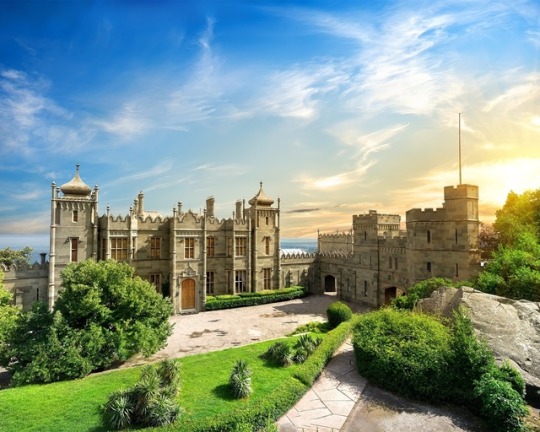
Vorontsov Palace, Yalta, Crimea, Russia
#ukraine#patrimoine#carte postale#chateau#russian#old#architecture#schloss#russia#vorontsov#vintage#yalta#castle#photography#monument#palais#postcard#crimea#photo#palace#alupka
180 notes
·
View notes
Text
Secrecy and Deception Chapter 1
The End and the Beginning (Wattpad | Ao3)
Table of Contents | Next
Event: Yalta Conference
Codename: Argonaut
Location: Livadia, Yusupov, and Vorontsov Palaces; Yalta; Crimean Autonomous Soviet Socialist Republic; Russian Soviet Federative Socialist Republic; Union of Soviet Socialist Republics
Date: February 4-11, 1945
The War in Europe was nearing its end, which meant that conferences were being held to discuss what would happen afterward. Even though America would rather be fighting on the front lines than attending these conferences, he was forced to come anyway, no matter how disagreeable everyone was.
The Yalta Conference, which America was attending now, was the second major conference between himself, Britain, and the Soviet Union, although Britain complained about who was attending.
“We really should have invited France to this,” Britain said once again as he walked into the Livadia Palace, where they were holding the meetings. America groaned.
“Please stop bringing that up. I know you wanted her to come, but this is getting annoying,” he said.
“I can’t believe they used to be sworn enemies, with Britain complaining about how she should have been involved like this,” Caleb commented with a scoff as America tried to suppress a grin at his comment.
“Well, things change. We knew that.” Unorganized Territory added.
“She’s an important member of the allies!” Britain insisted. America looked at him and raised an eyebrow.
“She got captured in six weeks.” America pointed out. While France was an ally, she spent most of the war under occupation and, therefore, wasn’t one of the major allies.
“I know she did; it’s just…I feel bad leaving her out of this,” Britain said. America sighed. Britain and France's getting along wasn’t new, as they had gotten along in the last war, but this was definitely the best America had ever seen them get along, and it was weird.
“I feel like we’re drunk. Was someone drinking last night? It’s the only thing that’ll make this all make sense.” Caleb said jokingly.
“I can tell. But stop complaining about it. She’s not coming. Let’s just get on with this meeting.” America added before he entered the room, seeing the Soviet Union already there.
“Привет Америка, Британия.” The communist nation said as they walked over to him.
“Hello, Soviet,” America responded.
“Hello Soviet. France asked me to tell you something for her.” Britain said. America groaned, knowing where this was going.
“What is the message?” Soviet asked, although the look on his face made it clear that he knew exactly what it would be.
“Va te faire enculer.” Britain said, a slight smile on his face. Dad enjoyed that more than he should.
“Oh, hold on, when have we been back at Dad? Jesus, has everyone lost it?” Caleb asked.
“He hasn’t lost it. America’s just realized the fact that he’s been denying for most of his life, that Britain is his father and should be addressed as such,” Rebecca added.
Mentally yelling for those two to shut up, America pushed the thought aside, trying to return his focus to the meeting. He was here for a conference to discuss the postwar reorganization of Germany and Europe. His personal problems would wait.
“She’s upset about not being able to come, Да?” Soviet said. Britain nodded.
“She is an ally. She feels jilted.” Britain said. America nodded. France was quite upset about that. She had even blamed President Roosevelt’s personal antagonism towards her leader as the cause.
“So the great British Empire has been reduced to an errand boy for his former rival,” Soviet said. America rolled his eyes, not wanting to listen to this argument.
“If you had let her come, she could speak for herself,” Britain responded.
“We aren’t here to talk about France. We’re here to discuss the postwar reorganization of Germany and Europe.” America said, cutting them off before they got wildly off-topic.
“You won’t let anyone have any fun today,” Caleb commented.
America was the host of this conference, even though it was taking place in Soviet territory. This meant it was kind of his job to keep this meeting on track. America was pretty sure none of them were eager to leave the war for too long. They all had agendas that they wanted to complete. This meeting would hopefully reveal the plans the other two had for after the war. That was kind of the whole point of it.
“Right, sorry. Which issue are we discussing first?” Britain said.
“Poland,” Soviet said eagerly. America raised his eyebrow at the taller nation. It seemed like Soviet had some demands he wanted to make and was eager to make them.
“Germany first. I know you probably have your demands, but the major issue is Germany. Unconditional surrender. We need to get unconditional surrender from Germany.” America pointed out.
“Obviously. We can agree on that. So, what happens after we ensure Germany’s defeat?” Britain said.
“We should each get a section of Germany to occupy,” Soviet said.
“And Berlin,” America added. Soviet turned towards him.
“What do you mean by that America?” He asked.
“We each get a piece of Germany to occupy, and we each get a piece of Berlin. It’s their capital, and I don’t trust one of us to occupy it all on our own and not take advantage of that. We should all get a piece of Berlin to make things fair,” America said.
“I hope you are including France in that,” Britain said.
“When we divide up Germany, we can carve out a zone for France,” Soviet suggested. Britain shook his head.
“General Charles de Gaulle will not accept a zone for France that was created in his absence.” Britain said, “Like I’ve been saying, France should have come here.”
“Well, I’m not agreeing to give France a zone if she has to create it herself. She should have stayed in the fight. She will be left out if she cannot let us create the zone she will occupy. She shouldn't even be a part of the governing body over Germany after this war.” Soviet said.
“Well, she won’t let us make the lines, but we can't leave her out. She may have been occupied, but she had fled to my island to fight and spent most of the war trying to regain the parts the puppet controlled and trying not to become one herself. You can’t blame her for being caught off guard by Germany’s invasion,” Britain argued.
“Oh yes, I can, and I—” Soviet began before America cut him off.
“What if the zone was created out of mine and Britain's? France needs to be part of this council. She was a major ally, even if it was only for the beginning and the end,” America suggested. Soviet paused and nodded.
“I can agree to that,” he said. America nodded, glad he could stop the argument before it got out of hand. They would have gotten nothing out of this if they had fought the entire time.
“My siblings gave you experience to help you deal with this.” Unorganized Territory joked.
“Are you compared mature nations to the states?” Caleb asked. There was a silence before Caleb sighed, as America tried his hardest to get them to shut up before he accidentally spoke to them and jeopardized any power and authenticity he had here.
“Well, now I’m sure we all want the demilitarization and denazification of Germany. We just need to go about the demilitarization a better way, as we are only in this situation because some countries—” America said, shooting a look at Britain “—didn’t try hard enough to ensure Germany followed the Treaty of Versailles and ignored Germany when he killed Weimar, took over and began violating the treaty. We can’t let that happen again.”
“Very true. We need safeguards against a possible military revival of Germany.” Soviet said.
“We need to target their leaders first. They are war criminals. We target them first, arrest them, try them for their crimes, and execute them—at least all the leaders. War criminals who are not leaders can be imprisoned or executed, depending on the severity of their crimes. But one thing must be true. The leaders who started this war will not be allowed to survive,” Britain said.
“Yes. We need to get rid of the people they rally around. Without leaders, it will hopefully help prevent nazism from staying around. And, if we are lucky, we will have a repeat of what happened in Italy, when the people turned against their government because they didn’t like it or what it was doing. That’ll make the entire process easier.” America said. Britain nodded.
“We can’t depend on the people working with us, though. Two major wars that the German people have lost within forty years. More likely than not, they will hate us and resist anything we did to get rid of that awful regime.” Britain added on.
“We also need to disarm them, ensure Germany cannot start another war, and can’t get their hands on weapons to start a war again. We also need to demilitarize them. We need to get rid of their military.” Soviet said.
“I agree. Actually, it seems we are all in agreement about that. We should save the specifics for when Germany has fallen, and we can assess the situation in Germany for ourselves.” America said.
“That seems reasonable. You can plan all you want, but plans are always better when you understand the situation. At least we have an understanding of what we need to do. But where should the war criminals be tried? In Germany, by us, or in the country where the crimes were committed?” Britain said.
“In the territory where the crimes are committed. Germany had wronged more than us three. The ones he wronged should be allowed to try the war criminals who wronged them and their people. Poland, France, Czechoslovakia, all of the countries who suffered because of Germany should get their say in the fate of these criminals.” America said.
“I agree,” Soviet said, but there was something off about his voice in the way he said that. America didn’t like it, but a feeling didn’t mean something was wrong.
“Then we need to move on to what war reparations Germany will be paying,” Britain said.
“And can’t ask Germany to do what we asked German Empire and Weimar to do. That debt just made them unable to function, and it's what allowed Germany to take over and start this war in the first place. That’s why my senate rejected the Treaty of Versailles and why I didn’t sign it, among other reasons. Listen, the point is we need a new solution. After all, we will still have Germany pay back their debts from the first war. If we give them the debts of this war, the nation will never survive, and we’ll probably be right back at square one. We can’t force Germany to take responsibility for all post-war reparations,” America said, slamming his fist on the table as he said the last part.
“You really think Germany, or whoever is the personification of Germany in the future, would be able to have enough money and supplies to start a war?” Britain asked.
“Should I remind you how I got my independence? When people are desperate, they do things that might seem insane but could end up working out. I don’t want to risk it. We need a solution that allows Germany to be punished, but not so they can’t function as a nation.” America explained.
“Do you have any ideas for a solution?” Britain asked. America shook his head.
“I have one.” Soviet said, “Forced labor. Let Germans repair the damage this war caused.”
“That’s…actually not a bad idea,” America said after a moment’s pause. If Germans were used to help repair the damage caused by the war, that would prevent them from having to pay for the entire war like they’d been forced to do after World War One. Sure, it could end up being misused, but for now, it was the best option they had and an option America liked.
“Yes, that solution does seem like the best if we want to avoid destroying the German economy again,” Britain said.
“So we are all pretty much in agreement over what we’ve discussed today?” America asked. Soviet and Britain nodded, “Great, well, I say we’re done for the day. We can move on to other concerns tomorrow.”
“Alright then. See you both tomorrow,” Britain said, gathering his stuff before he rushed out of the room, most likely to find his diplomatic or Prime Minister. America stood up as well, rubbing at his face as Soviet left the room.
America hope everything turned out alright in the end. Otherwise, what was the point of what they were doing?
——————————————
“I put this off so we could discuss Germany, but now I want to return to the topic I wanted to bring up first. Poland.” Soviet announced as they prepared for the meeting.
“What about Poland? His government-in-exile had already set out their demands.” America asked, raising an eyebrow.
“America, I don’t think he wants to listen to those demands,” James pointed out. America sighed, knowing that he was probably correct in his assumption.
“The Polish government-in-exile has given us non-negotiable demands. I will not be giving up the land that I annexed from Poland in 1939. The Curzon Line can define their eastern border.” Soviet said.
“You can’t just take land from a country you’re supposed to be liberating!” Britain said as America nodded in agreement.
“Poland can be compensated on their western border and take land from Germany,” Soviet said.
“Why can't you just give Poland back their land? You’re on their side now.” America asked, even though he knew reasoning with Soviet like this would not work. Still, it was worth a try. America can’t just let this happen. Poland is his friend.
“For the Soviet government, the question of Poland was one of honor and security because Poland has served as a historical corridor for forces attempting to invade my lands. My people have greatly sinned against Poland, and now we are trying to atone for those sins. Poland must be strong, and I am interested in the creation of a mighty, free, and independent Poland.” Soviet said.
“Well, the Polish government-in-exile has given you their demands for Poland because they are the governing power over Poland, even if you have that provisional government you set up. That provisional government is not the government of Poland.” Britain said.
“Yes, the new Poland you created isn’t actually Poland, and I hope you realize that,” America added.
“That’s something else I want to mention about Poland. I want you two to recognize the communist government I’ve set up over Poland.” Soviet said. Britain and America exchanged looks and then turned back to Soviet. That was a very large demand to ask of them, especially because Soviet had nothing to offer for their benefit. Soviet must be very confident of his power to make that demand.
“And why should we? Poland’s government-in-exile should be reinstated—all liberated nations should have their governments reinstated. Why should we make an exception for you?” America asked.
“If you give him this, he’ll just keep asking. It’ll be like Germany all over again.” James pointed out.
“These are negotiations, James. We have to give up something.” Caleb pointed out.
“Even our friends?” James asked.
“We’re countries. We don’t have friends the same way humans like you do. Now shut it and let Dad do his job.” Unorganized Territory said.
“Churchill and I want free elections and democratic governments for countries in Central and Eastern Europe, which includes Poland. We haven’t heard nice things about your government, Soviet. If we were to recognize this provisional government, you would need to ensure free elections, not just make a false promise you can turn your back on at the drop of a hat.” Britain said.
“And if I ensure that Poland has free elections?” Soviet asked.
“I’ll recognize your provisional government,” Britain responded. Soviet nodded.
“America?” Soviet asked. America bit his lip, thinking over this offer. America wasn’t willing to take it but for the sake of agreement and peace…
“Free elections. And you have my recognition. But this isn’t a decision we should rush into. We make the final decision at the next conference, after Germany surrenders,” America said. Soviet smiled and nodded, and America mentally apologized to Poland.
“You bastard, how dare you do this?” James said. He didn’t yell. He didn’t sound angry. Just resigned.
“And what do you want with the rest of Eastern Europe?” Britain asked.
“They can get their governments back. I’m only concerned about Poland because of its significance to my lands. I just want to ensure I won’t have to deal with another invasion. I want Eastern European nations to be friendly to my government and willing to cooperate with me,” Soviet said.
“And if these nations are ‘friendly’ towards you?” America asked, thinking of the puppet states in the Pacific and the horror stories he had heard from the reports coming from them.
Thinking about the Philippines, who was now being forced to fight America’s children.
“He wasn’t exactly our friend. He fought us before.” Rebecca snapped, her tone sharp.
“Maybe he’s not a friend, and maybe he has fought us before. That doesn’t mean he deserves to be a puppet, and it doesn’t mean he wants to fight us. He’ll get his independence, but once he gets his mind back,” Unorganized Territory responded.
“I will endure free elections in those nations as well. I just want to ensure my safety. I'm sure you two understand that very well,” Soviet said. America’s hand subconsciously moved towards the scar on his stomach—the one Canada had given him in 1814. America understood wanting to protect your country from possible invasions. And if they could ensure the promise of free elections…well, it wouldn’t be that bad.
“Very well.” America said, “They will be friendly towards you.”
“Let’s just hope that friendly doesn’t mean puppet in Russian,” James said.
“Friendly in Russian is дружелюбно or по-дружески.” Unorganized Territory snarked.
Soviet smiled, looking very proud of himself. He had gotten what he wanted, but Britain and America would have to ensure it didn’t turn out badly for those nations. It was the least they could do for making decisions about their lives without their knowledge.
“You could also just not do that,” James said.
“I believe we are done with Europe for now. Aside from one thing. Soviet, when are you going to end your occupation of the Baltic states, Lithuania, Latvia, and Estonia.” America said, standing up. Soviet stood up as well.
“They are my republics, America. They were annexed. Legally annexed. There is nothing more to talk about involving them.” Soviet said before leaving. America scowled.
“Yeah, legally annexed my ass,” James muttered.
“You’re on my side for that, right Britain?” America said, not turning to face his ally.
“Yes. Soviet does control the land; I can recognize that, but legally he should not. De facto, not de jure.” Britain said. America’s scowl deepened.
“We disagree there. I will recognize no Soviet control of the Baltics, de facto or de jure. That land is not land the Soviet Union should ever control.” America said before sighing. America didn’t like these agreements all that much.
But he had no other choice, not if he wanted to prevent another war.
“The road to hell is paved with good intentions, America,” James said. America clenched his fists and walked off to his room so he could yell at James without being called insane.
“I’m only pointing out what you don’t want to see,” James said.
“You’re too human, James. That’s not how we work.” America hissed.
“You have to see the other side of things eventually.” James said, “But if you refuse to, at least pay for Poland’s funeral. I don’t know why you gave up on him, but not the Baltics.”
“Don’t pretend like you know how I work,” America said as he entered his room.
“Don’t pretend like I haven’t been with you every day of your life since Roanoke. I’m the one person who probably knows you better than yourself. You know, the real you, not emotionless country you.” James said, causing America’s anger to grow.
“Shut it, James.” he snapped.
“Why should—”
“Shut it, James! I’m not dealing with your bullshit right now!” America said, gripping the sides of his head, wishing that he could just go away, wishing that he was alone in his head. James sighed.
“Sorry, America. But some… never mind. Get some rest.”
———————————————
“So.” America said, clapping his hands together before pointing them at Soviet, “Are you going to join us in the United Nations organization.”
“I don’t know. I don’t really have a reason to believe it will work. The League of Nations didn’t work, and besides, I got kicked out of that.” Soviet said.
“You got kicked out because you invaded Finland,” Britain said.
“I know, but we already have seen how this doesn’t work. Give me a reason to join this little organization,” Soviet said.
“Soviet, it’s an organization that helps keep peace. We gave you what you wanted with Poland because you said you wanted to avoid being invaded. Doesn’t that mean you want peace? Why shouldn’t you join?” Britain reasoned. Soviet rolled his eyes.
“The League of Nations didn’t work. And now you’re asking me to join this organization, which is essentially the same thing. It will not work, and I will not waste my time joining it.” Soviet said.
“He already exists, you know. And we’d like to keep it that way. What would convince you to join?” America asked.
“Assurance that this will work. And something that’ll make this worth my time. Soviet said.
“What if…you’ll be a permanent member of the Security Council, so what if we gave permanent members of the United Nations Security Council the power to veto any decision the United Nations makes? If you join, you’ll be a permanent member and get that power,” America offered.
“So I'll have the power to block unwanted decisions?” Soviet asked. America nodded. “Well, then, I’m much more interested in joining this little organization. What about my republics?”
“I can’t tell if he thinks he’s being subtle,” James commented dryly.
“I think Britain gave you high expectations. Everyone else isn’t as…subtle as him.” Rebecca pointed out. James snorted.
“It’s that thinking that gets you wrapped around their finger and obeying their every command before you know it,” James responded.
“What about them?” America asked.
“Will they be given membership to this organization? If I join this organization, I want all sixteen of my republics to join.” Soviet requested. America exchanged looks with his fat—with Britain.
“I…I think that’s something we’ll have to take into consideration. When we asked if you would join, we meant just you.” America said.
“But I am a union, and I want my republics to join this organization if I do,” Soviet said.
‘So are me and Britain, but you don’t see us asking for our states or countries to join,’ America thought, annoyed. It was clear Soviet was doing this to gain more power in the United Nations, especially since the agreement that permanent members would get the power to veto decisions convinced him to join.
“What if we, and by that I mean America and I, talk about your republics and whether they should be allowed to join? We’ll get back to you once we’ve figured it out. After all, I’m also a union, and I don't see the need to make Scotland, Wales, England, and Northern Ireland members of the United Nations,” Britain argued. Soviet shrugged and nodded.
“That sounds fair. But try to decide before this conference ends. We have a war to get back to, and I don’t want you to waste your time trying to figure out if my republic should join rather than spend it fighting in the war.” He said before leaving the room, most likely to give them time to discuss his republics. America exhaled.
He hated diplomacy sometimes.
———————————————
Finally, they were getting to the issues America cared the most about. Sure, Europe was important, but the war in Europe was almost over, and the Pacific war was still raging.
“Germany is going to fall soon, that much is certain, but we need to figure out what will happen in the Pacific. Who knows when Japan will surrender? That’s the most pressing issue at the moment, in my opinion,” America said, starting the day’s discussions.
“What are you asking?” Soviet said.
“I would appreciate your assistance in the Pacific. Germany will fall soon, so your troops will no longer be occupied by others fighting him. You’ll be able to offer more assistance. The island-hopping campaign is effective but slow. Japan won’t surrender until she has no more troops left, I’ve learned. China and I would appreciate your assistance,” America explained.
“What do I get in return?” Soviet asked. America raised an eyebrow.
“The defeat of an Axis power. Don’t pretend like you don’t want Japan out of the picture. We all want the Axis gone. What do you want?” Britain asked.
“I want you to recognize Mongolian independence from China. I also want recognition of my interests in the Chinese Eastern Railway and Port Arthur, but I don’t want the Chinese to lease it to me. I also want the return of South Sakhalin and the cession of the Kuril Islands by Japan.” Soviet said. America nodded, thinking over his many demands.
“And in return, if I agree to this?” America asked.
“In the two or three months after Germany has surrendered and the war in Europe is terminated, I will join you against Japan,” Soviet said. America nodded.
“I’ll agree to these terms in exchange for your assistance once we take out Germany,” America said, holding out his hand to shake Soviet’s. Soviet nodded and smiled.
“I’m glad we’ve reached an agreement. My Red Army will take the southern half of Sakhalin Island as one of its first objectives, and American assistance to defend Kamchatka would be desirable,” Soviet said.
“My troops are busy with many things, but if I had troops that could help by the time you join, I’ll see what I can do. But let's save the talk of military action for when you join. Things change fast in war,” America said.
“Indeed they do,” Soviet said.
“Well, I do believe that wraps up matters for now,” Britain said. America nodded in agreement before remembering something.
“Soviet! Ukrainian SSR and Byelorussian SSR can join the United Nations. The rest of your republics cannot. On one condition.” America said.
“And what would that be?” Soviet asked.
“I have the right to seek two more votes for my country,” America said. Soviet nodded.
“You have a deal. I’m glad everything has been working out between us.” He said.
“So am I. It’ll be nice to end a war knowing you have strong allies with whom you also have strong relations. Now, can you two move out of the way? I will return to the western front to ensure my brothers didn’t mess anything up.” Britain said, shoving past them. America moved out of his way, Soviet did the same.
“I should also head back to the front. See you in Germany, Soviet.” America said before leaving, much more confident. After all, at least they had some semblance of what the post-war world would be like, and it seemed like the post-war future would be a happy and peaceful one.
#countryhumans#secrecy and deception by weird#countryhumans britain#countryhumans america#countryhumans ussr#historical countryhumans
3 notes
·
View notes
Text
And my next post in support of Ukraine.
Next site, the Church of the Transfiguration (in Ukrainian Spaso-Preobrazhenska) in the village of Moshny in Cherkasy Oblast. It was built in 1830-1839. It was originally part of a palace and park complex of Count Mikhail Vorontsov, a "russian" nobleman and field-marshal who served in the Napoleonic wars and in the Caucasian War. The church is the only part of the complex that is still preserved. The architect, Giorgio Torricelli from Italy, created an exact duplicate of the church in France near Paris.
#StandWithUkraine
#SlavaUkraïni 🇺🇦🌻




7 notes
·
View notes
Text
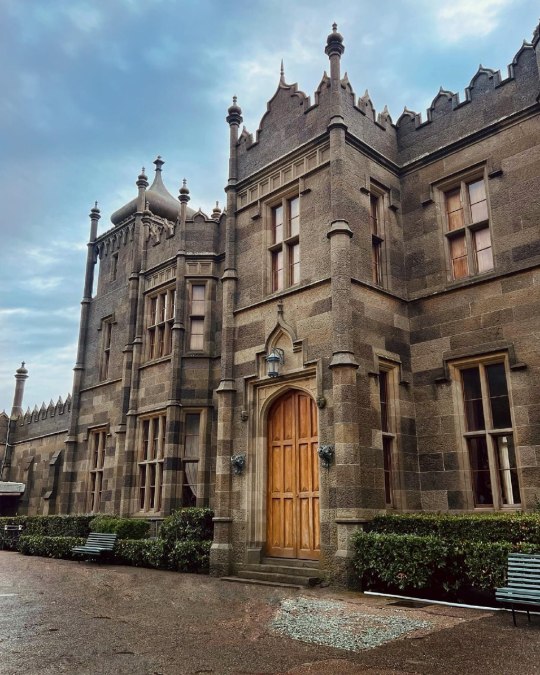
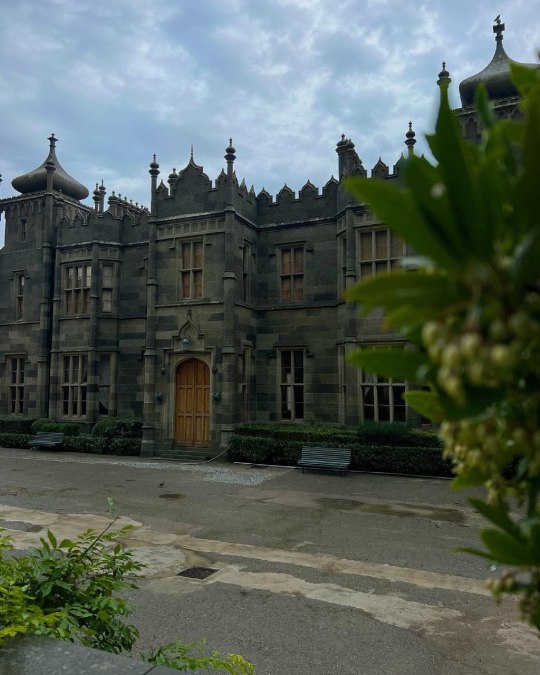
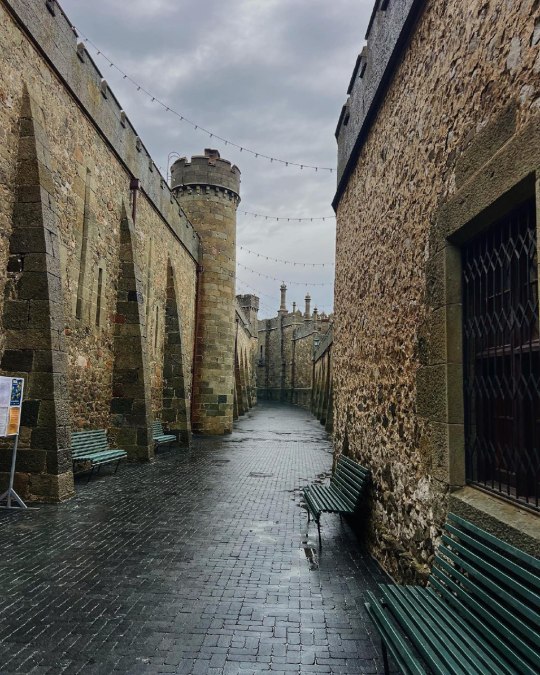
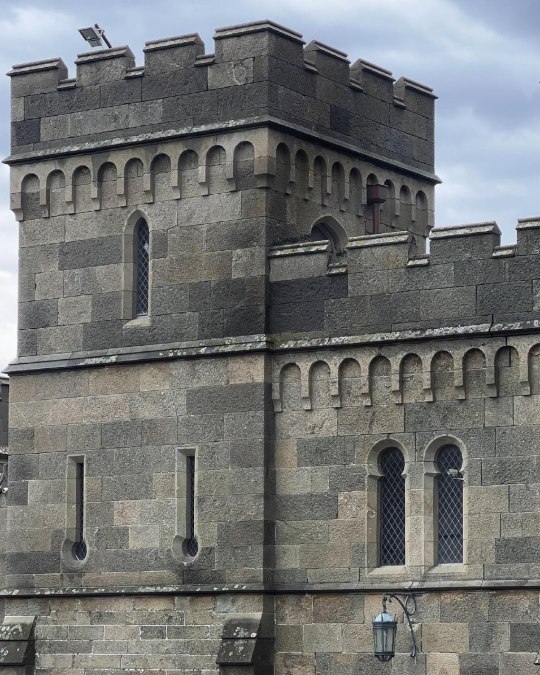
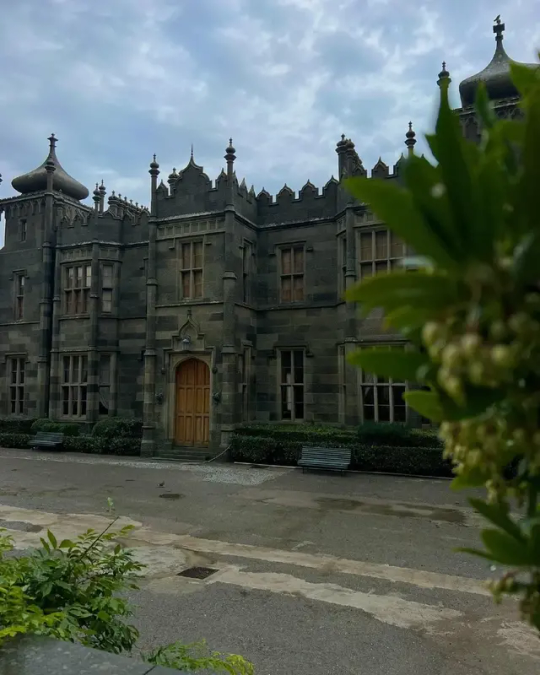

🏰 Vorontsov Palace - One of the most popular places in Crimea among tourists, along with Massandra, Livadia Palace and Swallow's Nest.
📍 The Vorontsov Palace is located in Alupka, 15 km from Yalta.
⚒ The palace was built of diabase (a volcanic rock with properties stronger than granite) in the English Gothic style.
60,000 servants and soldiers worked on its construction for 20 years (from 1828 to 1848).
9 million silver rubles were spent.
🏯 In 1921 the palace became a museum, but during the Great Patriotic War it was looted.
The amount of damage was estimated at 5 million rubles.
In 1956, a museum was reopened in the castle, and since 1990 the Alupka Palace and the Park Museum-Reserve have been located here.
🌳 The palace is surrounded by a centuries-old park, which contains 200 species of trees and exotic plants.
📷 Katerina
🏰 Palazzo Vorontsov - Uno dei luoghi più popolari in Crimea tra i turisti, insieme a Massandra, Palazzo Livadia e Nido di rondine.
📍 Il Palazzo Vorontsov si trova ad Alupka, a 15 km da Yalta .
⚒ Il palazzo fu costruito in diabase (una roccia vulcanica con proprietà più forti del granito) in stile gotico inglese. Alla sua costruzione lavorarono 60.000 servi e soldati per 20 anni (dal 1828 al 1848). Sono stati spesi 9 milioni di rubli d'argento.
🏯 Nel 1921 il palazzo divenne un museo, ma durante la Grande Guerra Patriottica fu saccheggiato.
L'ammontare dei danni è stato stimato in 5 milioni di rubli. Nel 1956 nel castello fu riaperto un museo e dal 1990 qui si trovano il Palazzo Alupka e la Riserva-Museo del Parco.
🌳 Il palazzo è circondato da un parco secolare, che contiene 200 specie di alberi e piante esotiche.
📷 Katerina
0 notes
Text
Page 224
like people tend to do. There is nothing you need to do to become a better version of yourself apart from diving deeply into this information. It will soak into you and transform you and your whole life.
My friend and I visited the Hermitage with a guide. When I drew a matrix in 2010, I asked a Mystic-old man: “Is it true that this matrix exists? And he said: “Yes, the Hermitage has something similar.” I found it on the corners of one of the first rugs I saw. Here is this matrix. A triangle pointing up in the right lower corner. And a triangle pointing down on the left lower corner. (“Apollo and the Zodiac” tapestry, c. 1560, Hermitage)
Guide: Here is the Arrow of Vasilyevsky Island. And there is the building of the former stock exchange. Go up to the third step. Stand on a spot slightly to the left from the center and see what you feel there.
Alexandr: Okay, thanks!
Guide: I can name many places and spots like these.
....
Alexandr: How about Vorontsov Palace?
Guide: Yes, the Suvorov military school. The Maltese chapel is there.
Friend: Where is it? Behind it?
Guide: You can go to the palace, but you can only get in with a guided tour. Go further inside, and there is the chapel. It is also very interesting, and you will feel it too.
....
Guide: Well, first of all, it is the Kazan Cathedral.
0 notes
Text
Vorontsov Palace in Alupka, where Churchill stayed during the Yalta Conference in 1945, Ukraine
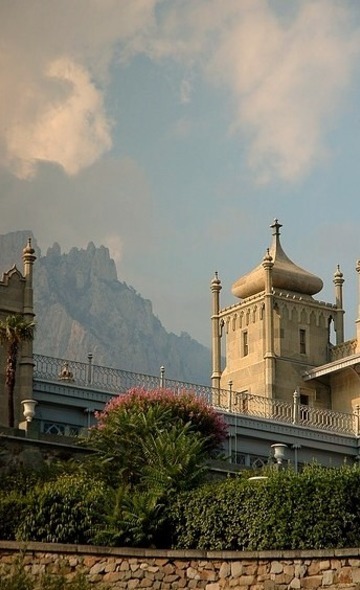
1 note
·
View note
Text


This is a swan lake located near the Vorontsov Palace. Since the water circulates constantly, the lake does not freeze even in winter.
0 notes
Text
[ad_1] Mr. Trukhanov spoke to UN News shortly after the decision was announced, on Wednesday, and explained the laborious process that led to the inclusion.Odessa Mayor Gennady Trukhanov. Gennady Trukhanov We applied for inclusion in the UNESCO World Heritage List back in 2009 and were accepted into the provisional list. But the procedure dragged on and, with the onset of the war, there was a real threat that our architectural monuments would be destroyed.So, in the first month of the invasion by Russian troops, I turned to our Ministries of Culture and Foreign Affairs, in order to apply for the accelerated inclusion of our historical centre and port in UNESCO’s World Heritage List.We are very grateful to UNESCO for its support. We held a lot of meetings online, and UNESCO provided us with consultants who helped us to complete our dossier correctly. Almost every day we were in close contact with them and, without their support and legal advice, it would have been very difficult to do all this work.We have a very difficult job ahead of us: a UNESCO commission will come to us within the next couple of months, and we need to create a body to monitor the preservation of our cultural heritage.UN News: Since the first days of the invasion, Odesa has been regularly attacked. What have the city authorities done to protect the historical part of the city?Gennady Trukhanov: We covered all our monuments with sandbags, but it is difficult to ensure complete security. For example, a blast from a rocket that was shot down damaged an architectural monument, the Vorontsov Palace on Prymorskyi Boulevard, part of the roof was destroyed, and the windows were smashed out.Of course, there’s nothing we can do in the case of a direct hit, but we can protect our monuments from a blast wave, from fragments. The Opera House was surrounded by bags for a long time, but later we partially unblocked it in order to show that today Ukraine still lives, and that we support our cultural values.Our colleagues in Italy, who have extensive experience of cooperation with UNESCO, suggested that we transfer especially valuable paintings from our museums to them for temporary storage, since we constantly experience power outages, heat supply, and paintings need a certain temperature regime. We are considering taking advantage of this offer.UN News: Despite the war, does cultural life continue in Odesa today?Gennady Trukhanov: Yes, cultural life in Odesa continues.Premieres and performances are being held at the Opera House in compliance with all security measures; this means that attendance numbers are limited to the capacity of the bomb shelter.We think that engaging in cultural activities is therapy for the population, so that they don't get too depressed. The war has been going on for almost a year, and it can be difficult to maintain morale.© UNOCHA/Levent KuluThe first commercial vessel carrying grain under the Black Sea Grain Initiative.UN News: The port of Odesa is one of the three participating in the Black Sea Grain Initiative. How has life in the city changed since the program started?Gennady Trukhanov: I was born and raised in Odesa and, when the port stopped working, ships did not sail, and the port was silent. it was very sad to see.But since the beginning of the implementation of the Initiative, which became possible thanks to international assistance and the personal efforts of the UN Secretary General, it was possible to start the work of the port and restore the transportation of humanitarian cargo.For port workers, and all the companies whose activities are connected with the port, it was of great importance, as well as for all of us, and for the whole world. It's like a return to the life we had before.We would like the Initiative to be extended, although we understand that all this is not easy. We support these efforts, we are grateful for them. and we hope that they will be crowned with success. [ad_2] Source link
0 notes
Photo

Vorontsov Palace, Saint Petersburg (by Viacheslav Direnko)
#vorontsov palace#vorontsov#saint petersburg#europe#travel#travel blog#architecture#park#garden#europe travel#russia
540 notes
·
View notes
Photo









Vorontsov Palace (Alupka Palace), Ukraine
1. Southern facade 2-4. Greenhouse 7. Mirror Lake
#architecture#vorontsov palace#alupka palace#ukraine#palaces#ukrainian architecture#greenhouse#conservatory#gardens
50 notes
·
View notes
Photo

The Yalta Conference, also known as the Crimea Conference and code-named Argonaut, held February 4–11, 1945, was the World War II meeting of the heads of government of the United States, the United Kingdom, and the Soviet Union to discuss the postwar reorganization of Germany and Europe. The three states were represented by President Franklin D. Roosevelt, Prime Minister Winston Churchill, and Premier Joseph Stalin, respectively. The conference was held near Yalta in Crimea, Soviet Union, within the Livadia, Yusupov, and Vorontsov Palaces.
The aim of the conference was to shape a post-war peace that represented not just a collective security order but a plan to give self-determination to the liberated peoples of post-Nazi Europe. The meeting was intended mainly to discuss the re-establishment of the nations of war-torn Europe. However, within a few short years, with the Cold War dividing the continent, Yalta became a subject of intense controversy.
Yalta was the second of three major wartime conferences among the Big Three. It was preceded by the Tehran Conference in November 1943, and was followed by the Potsdam Conference in July 1945. It was also preceded by a conference in Moscow in October 1944, not attended by President Roosevelt, in which Churchill and Stalin had spoken of European Western and Soviet spheres of influence.
* Photo Above: British Prime Minister Winston Churchill, U.S. President Franklin Roosevelt, and Soviet leader Joseph Stalin met at Yalta in February 1945 to discuss their joint occupation of Germany and plans for postwar Europe. Behind them stand, from the left, Field Marshal Sir Alan Brooke, Fleet Admiral Ernest King, Fleet Admiral William D. Leahy, General of the Army George Marshall, Major General Laurence S. Kuter, General Aleksei Antonov, Vice Admiral Stepan Kucherov, and Admiral of the Fleet Nikolay Kuznetsov.
Daily inspiration. Discover more photos at http://justforbooks.tumblr.com
#JUST FOR BOOKS#Yalta Conference#Crimea Conference#Yalta#Crimea#Livadia Palace#Yusupov Palace#Vorontsov Palace#Soviet Union#Big Three
7 notes
·
View notes
Photo

Vorontsov Palace, St. Petersburg, Russia,
Photo by Yura Ukhorskiy
#art#design#interiors#interiordesign#palace#vorontsov palace#st petersburg#russia#luxuryhouses#luxutyhomes#luxurylifestyle#yura ukhorskiy#style#history
264 notes
·
View notes
Photo

Vorontsov. Vorontsov family
#vorontsov#vorontsov family#vorontsov nobility#vorontsov count#vorontsov aristocracy#vorontsova countess#vorontsov palace#vorontsov St Petersburg#vorontsov semyon#vorontsov UK
2 notes
·
View notes
Text


The Vorontsov Palace, Alupka, Crimea
0 notes
Photo


Speedpaints, December 2-3, 2017
30 minutes each
#speedpaint#jessica ferry#digital art#shinjuku#vorontsov palace#statue#my art#december 2#december 3#2017
3 notes
·
View notes